— The world-class New York Times graphics department designed charts depicting the scenarios under which each team will advance to the knock-out stage of the Football World Cup.
Posts from November 2022
Feedland
— Feedland, a new type of feed reader, was released not too long ago by Dave Winer, the father of RSS. Feedland is different; it’s not just a simple reading tool but tries to integrate community features to discover new sources, like articles and share them using Radio3, a link-blogging tool also built by Winer. I’ve used Feedland for a couple of weeks and have mixed feelings overall. It doesn’t click with me.
Some excellent ideas are built into Feedland, which make for a wildly different experience compared to conventional feed readers:
- The news view, I believe Winer calls it the River, lists recent articles grouped by source in reverse-chronological order. It’s like a Twitter feed without the noise.
- There is no read/unread status for posts. Gone are the constant reminders that there’s another thing I need to read. If I don’t get to it today, I’ll probably never get to it. And that’s fine.
- I can see other people’s subscriptions. If I read something I like, I can see who subscribed to the same feed and what else they are reading. It’s a great way to explore new content without the algorithms of today’s silos, constantly shouting at you, “hey, look at this too.”
- It has an everyone’s-news page, listing all the items from all feeds that all Feedland users have subscribed to. Another way to find new content.
The positives are offset by a couple of awkward design decisions and an overall experience that feels unfinished.
- You need a Twitter account to sign up, which probably made Dave’s life much easier. Still, if you’re building a site focussing on openness and interoperability, you shouldn’t use one silo’s login mechanism that might even go out of business soon. (But then Winer was (is?) a Twitter shareholder, which shines a different light on the decision.)
- The user interface is clunky and slow, and most features are hidden away in drop-down menus on the top of the site, not where I’d expect them. I only learned that there are different views through one of Winer’s posts, but I needed a direct link at first to get to these views. Sometimes I would click on a link only to see an obscure error message like “Can’t display the Likes because the feed is not in the database.”
- Why is the feed list the default view, showing a list of all feeds you’ve subscribed to? You have to expand to a feed’s latest posts. Why is the default view not the “River,” listing all recent posts in reverse-chronological order?
- The special pages, everyone’s news and the hotlist, are mostly useless. While I like that I can explore what everyone on Feedland is reading, it’s mostly news sites and tidbits from Winer himself. The more interesting content that is from something other than the New York Times or the BBC, that content is hard to find.
- Feedland strips any markup from most feeds, including blockquotes, emphasis, and links. If want a link, I need to click through to the post on the website to get the whole experience. The only feeds in my timeline that aren’t affected are from Winer himself.
All in all, Feedland is not a useful product. I don’t need the likes, I won’t use Winer’s link-blogging tool, and the most valuable views are either littered with sources I want to see or require too much clicking around on the website to reach. I will stick with NewsNetWire to read the sources I follow and turn to blog directories to discover new stuff.
— Geopolitics, contested borders in south and south-east Asia, have found their way onto James Cheshire’s map-themed Christmas baubles.
— Jamie Zawinski: “Do Not Use Services That Hate The Internet.”
If posts in a social media app do not have URLs that can be linked to and viewed in an unauthenticated browser, or if there is no way to make a new post from a browser, then that program is not a part of the World Wide Web in any meaningful way.
Hunt For The Wilderpeople
— This was fun and heart-warming. Taika Waititi’s films are always a joy; funny but not silly, quirky but never pretentious.
Hunt For The Wilderpeople (2016). Director: Taika Waititi. Cast: Julian Dennison, Sam Neill.
Epicly Later’d pictures film-maker Harmony Korine, his films, influences, and art. Korine is best known for writing the script for the movie Kids, an unfiltered look at the life of a group of unsupervised adolescents in New York spending a day between shoplifting, assaulting strangers, consumption of a wide range of drugs and sex. This documentary shows that Kids isn’t even his most controversial work.
— Wish I had Times Newer Roman when I was at university:
Introducing Times Newer Roman, a font that looks just like Times New Roman, except each character is 5-10% wider.
Fulfill lengthy page requirements with hacked margins, adjusted punctuation sizing, and now, Times Newer Roman!
Migrating to Django
— I migrated the blog from a static page rendered by Jekyll to a more heavy-handed, custom-built blogging engine using Django.
While I’m a proponent of statically rendered websites for their speed and security, maintaining a blog that is updated several times a day is arduous. Yes, there are ways to simplify publishing through custom scripts or content-management systems bolted on top of the Git workflow. But creating posts with custom scripts still requires committing and pushing every time. I tried NetlifyCMS for a while, but it’s a bug-ridden application that introduces strange hidden characters into posts, and editing content is a drag because the cursor has developed a life on its own.
These issues can be fixed, but my goals with this website are bigger than frequent updates.
I want this site to be part of the IndieWeb, a community of independent content publishers. I want to accept and send Webmentions, post from external editors via Mircopub, and integrate my reading and writing workflow that allows me to create posts from a custom feed reader. Achieving these goals is nearly impossible when you manage a site using a static page generator unless you want to rely on more third-party tools.
I want to control every aspect of this website. If it hums along, I did a good job; if it’s broken, I broke it. It’s a place for experimentation with new technology, to learn how to build a web of independent websites and understand the technology that drives it.
All this is much more work than running a simple static website and occasionally typing words into a markdown file. But it will be worth it for the sake of creation. This blog is a garden that I want to nurture and maintain. I want a place for my own to built and design software in a way that isn’t prescribed by client requirements or constrained by the design decisions of a blogging software somebody else built.
Or I might just need therapy.
— How to Weave the Artisan Web by John Scalzi:
Wouldn’t it be nice to have a site that’s not run by an amoral billionaire chaos engine, or algorithmically designed to keep you doomscrolling in a state of fear and anger, or is essentially spyware for governments and/or corporations? Wouldn’t it be nice not to have ads shoved in your face every time you open an app to see what your friends are up to? Wouldn’t it be nice to know that when your friends post something, you’ll actually see it without a social media platform deciding whether to shove it down your feed and pump that feed full of stuff you didn’t ask for?
Yes, indeed, that would be nice. How realistic is it, though, that the vast crowd that built a following on social media using its straightforward publication and amplification methods; that these people will start to develop and maintain their own websites?
— Ever wondered why Japanese websites look so different? Me neither. Sabrina Cruz looked into it anyway and found some interesting insights into how it is different and why.
The post doesn’t seem to have a permalink, here’s a snapshot on the Web Archive for future reference.
Democracy Sausages
— Even if you’re not eligible to vote in Australia, there’s enough reason to get up bright and early on a Saturday and head to the polling station: Democracy sausages.
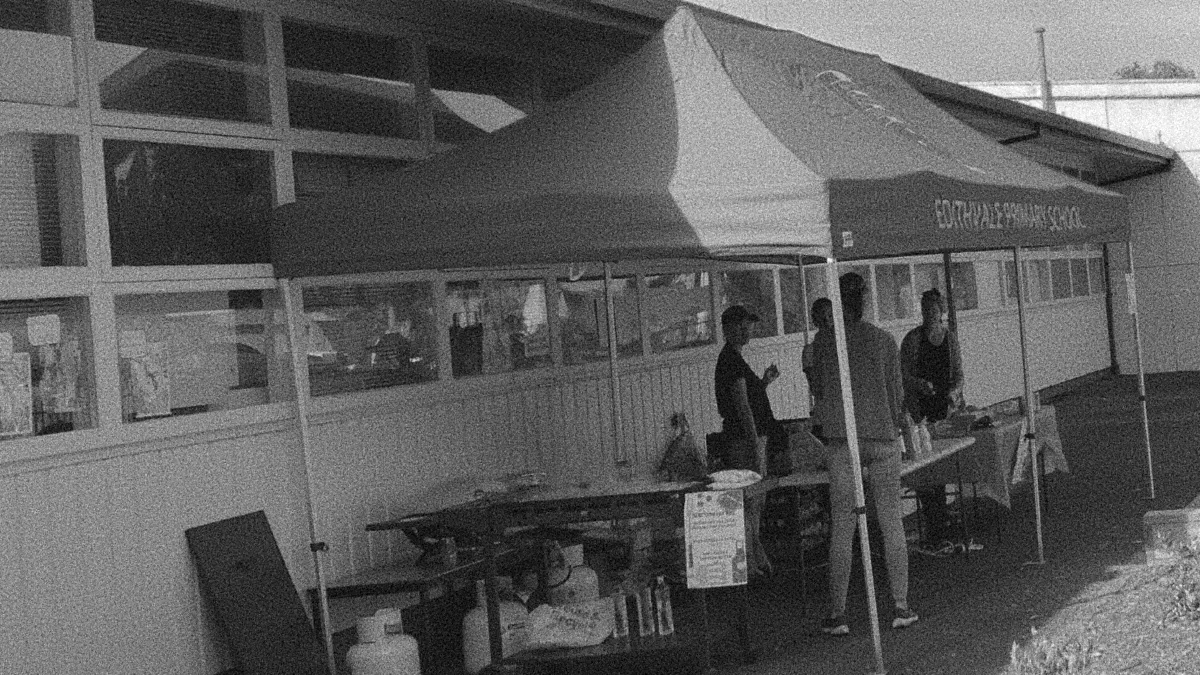
Small stalls selling bacon-and-egg buns for breakfast or sausages later in the day are a familiar sight outside Australian polling stations. Just as the canvassing volunteers and their last-ditch attempts to convince voters with rehearsed statements like „I stand for integrity politics, “ whatever that means.
The proceeds of the sausage sales go to the institution hosting the elections, often local schools. Or so; I hope that’s where the money goes, and not towards the teacher‘s end-of-year party. Voting is compulsory in Australia, so there’s a good chance to prop up the funds for the school‘s art department.
Nobody knows precisely when the beloved tradition started. There have been sightings of election-day bake sales as early as the 1930s, although the popularity and omnipresence of democracy sausages are a recent phenomenon, amplified, of course, through social media. Today a crowd-sourced map shows where there’s a sizzle going, what they serve, and when. And the bake sales are coming back too.
The bacon-and-egg bun from Edithvale Primary School was a good, solid 4 out of 5; would vote again.
— Speaking of Matt Webb, his blogroll is an absolute treasure trove.
Back in the old days, many blogs had a blogroll listing links to other blogs the author followed. Blogrolls were the way to discover new blogs and rediscover old ones. With the arrival of Tumblr, Medium, and Substack, which mostly replaced publishing on self-hosted and self-built websites, blogrolls disappeared almost completely.
But there’s hope. Matt’s blogroll lists more than 200 blogs, most with RSS feeds, including many old gems I had forgotten and many I had not yet heard of before.
— Matt Webb set himself 15 rules for blogging as a guide to post more often without overthinking the process. He has posted to his blog for 139 consecutive weeks. That’s getting close to three years. Looks like it works for him.
Land of the Giants: Titans of Tech
— Land of the Giants: Titans of Tech is a documentary series that traces the history of big tech corporations known as FAANG: Facebook, Apple, Amazon, Netflix, and Google.
I saw episode S1E4 last night, which covers Google’s origin story, the role of Eric Schmidt, the acquisitions of YouTube and Android, the antitrust lawsuits and employee walkouts.
You will only gain few new insights if you generally follow developments in tech. What is worth noting, though, is the substantial airtime female experts received, including former employees like Marissa Mayer, Timnit Gebru, or Claire Stapleton and journalists such as Kara Swisher and Joanna Stern.
Land of the Giants: Titans of Tech (2022). Currently streaming on SBS On Demand in Australia.
— ooh.directory is a categorised directory of over 850 blogs, including a feed of the most recent posts.
— Rands has a rare talent; he explains complex issues using simple words:
So, forever growth must be proven, advertising must fund forever growth, so advertising must continually increase. This means you, the person just looking for Interesting X, must be incentivized to see and click on more relevant advertisements. The services need more data to provide more relevant advertisements and fund forever growth. These services require you to engage more.
They’ve already helped you find your people, and you’ve already helped them out by providing your social graph and high-affinity content for this graph, but they need more because of forever growth. You already see ads, and perhaps you’ve clicked on some of them, but now you start seeing “content we think you’ll like.”
Of course, this is all in the context of him opening a Mastodon account.
— Last.fm turns twenty. One of those services that have been around for what feels like ages and, apparently, still have a thriving community.
— How to move an obelisk. Via @ftrain:
Here’s an article on how they move obelisks in case you are moving any obelisks today.
— The leap second, which is occasionally added to synchronise atomic and astronomical time, will be abandoned in 2035.
We know this introduces a new problem now, but we’ll leave it for future generations to sort out:
Resolution D calls for U.T.C. to go uninterrupted by leap seconds from 2035 until at least 2135 and for metrologists to eventually figure out how to reconcile the atomic and astronomical time scales with fewer headaches. The international time standard would be severed from time as told by the heavens for generations to come.
Whether you work in timekeeping, make software, or pretend to tackle climate change—punting seems a universal approach to complex problems.
Also interesting is this nugget from a scientist sponsored by the Catholic Church:
[…] rejoining those two time scales was imperative, said Rev. Pavel Gabor, an astrophysicist and the vice director of the Vatican Observatory Research Group in Tucson, Ariz. He said that atomic timekeeping was just one example of how the world was becoming incomprehensible to the average person, and that scientists had a responsibility to help people feel in control of their lives.
“I think sensitivity to this mistrust of elites, mistrust of experts, mistrust of science and institutions, that’s something that’s a very real problem in today’s world,” he said. “And let’s not contribute to it.”
The vast majority of the world’s population doesn’t know the leap second exists, let alone how it complicates the world’s affairs. The leap second, of all possible reasons, isn’t the reason the “average person” distrusts elites and science. It may have something to do with how our political, economic, and spiritual leaders conduct themselves.
Parasite
— I’m usually apprehensive about films that were both heavily awarded and the talk of the town amongst critics. Often it means the movie is just dull. But Parasite was fantastic.
Parasite (2019). Director: Bong Joon Ho. Cast: Song Kang-ho, Lee Sun-kyun, Cho Yeo-jeong. Currently streaming on SBS On Demand in Australia.
— Cennydd Bowles argues that it’s ok, ethically speaking, to watch the Football World Cup.
I have watched fewer and fewer games of big football tournaments in recent years. I no longer have time to sit around and watch football for four weeks. But the fact that recent tournaments were hosted in countries with questionable track records on human rights and FIFA’s shenanigans didn’t help either. This time it’s likely I won’t watch any of the games, if only because the kick-off times don’t favour audiences in Australia.
— Fred Brooks, Turing-Award winner and author of The Mythical Man-Month, has passed away. Brooks was responsible for Brooks’ law, one the most renowned, and at the same time, consistently violated laws in software project management.
— No beer will be served at the football World Cup in Qatar. Obviously, the ban won’t apply to you if you have enough money or licked the right boots:
Beer and other drinks, including an official FIFA Champagne and an array of sommelier-selected wines, will still be available in stadium luxury suites reserved for FIFA officials and other wealthy guests.
Thoughts and prayers to all the English fans who now must endure the scorching heat drinking water.
Recent Proceedings at Twitter
— There have been enough comments about the last couple of weeks at Twitter. Many strange things have happened, I’m going to post my short list with link here for future reference.
- The new owner, on his first day, carries a sink into the company headquarters, “Let that sink in,”
- Actors pretending to be staff that were fired,
- Engineers print out code for review with external engineers,
- People are sleeping in the office to meet ridiculous deadlines. Obviously, some are cool with that,
- Employees are sacked via email, the equivalent of being dumped via text,
- Some of the engineers who remained are fired for criticising Musk in public and privately, and
- People are asked to commit to inhumane working conditions, many leave.
The list is likely incomplete, I might add more links in the following weeks.
— no-ht.ml is a website written entirely without HTML.
— Volume 6 of the NACIS Atlas of Design has been published in October. You can preview some of the maps included in the edition, and they look delicious.
— Per freedom-of-information request, the most popular journeys on the London tube.
Brett Novak’s films are pieces of art; not to mention Isamu’s immense skill in this one.
— A short history of technology hubs in the US. Surprisingly, the article, published only a year ago, is only available from the Internet Archive. The Reboot is now a crypto site.
For RSS to Thrive, Make It More Prominent
— RSS used to be ubiquitous. Every blog had an RSS button somewhere. So did many news sites in the days before social media. RSS is making a comeback at the moment, but it’s nowhere as omnipresent on websites as it used to be.

What happened? Safari supported RSS in the past. Apple added some basic support to the browser in 2004 but removed the feature in 2012. Some connect RSS’ decline to the popular Google Reader, which was axed in 2013. I’ve never used Reader, and there have always been alternatives. I don’t think that the lack of feed-reader software led to the demise of RSS adoption.
What happened was monetisation. To make money on the Web today, you either charge users for your product or sell ads. Many news and social media sites offer content of varying quality, and they are rarely essential to people’s lives, so users usually won’t pay for their usage. So you sell ads. And to sell ads, you need page views. To get page views, you want visitors to linger on your site to open as many pages as possible.
RSS encourages usage patterns that oppose continued engagement. It notifies readers when a new story is posted; there is no incentive to constantly re-visit sites to check for updates. Likewise, the barebones nature of how feeds are presented doesn’t trick you into clicking elsewhere. You read what you’re interested in and move on to the next.
As a result, big sites removed or stopped advertising feeds on their pages:
- Twitter used to offer RSS feeds. Some argue they removed them because Google Reader didn’t display title-less feeds correctly. Yeah right. They removed it, so people sign up for Twitter because that would be the only way to follow someone.
- Medium offers RSS feeds but hides them. At least they’ve got instructions on how the subscribe in their docs.
- The New York Times offers a wide variety of feeds, but you have to Google to find them.
- So does The Guardian.
- The German weekly paper Die Zeit has an RSS feed but doesn’t advertise it, even though they ran a piece about RSS in 2020.
- Most indie blogs offer RSS, but there are still a surprising number of sites that don’t display a link to their feed. I have to view-source and sift through the page
headerto find the link.
What can we do to make RSS a format that isn’t just appreciated by a few nerds? Advertise RSS. The RSS icon that used to be universal, you could find it on many, many websites. We need to put RSS on every website that offers feeds. Unfamiliar users will get curious. And they might try using a feed reader, which will stick because it is convenient. They will demand better integration into browsers and ask big news websites to offer their feeds more prominently.
— brands.town is a Mastodon instance that houses fake accounts of well-known brands, including a surprising amount from Australia like CentreLink, Metro Trains and the Australia Australia Australia Party. Full of valuable information.
— Anna Mancini tells the story of how the Apple archives ended up at Stanford. It’s strange how much major news outlets either recite wrong accounts or rewrite history to fit the narrative of the larger-than-life leader who was just as visionary as he was rooted in history. And how you rarely hear about the people who get done seemingly mundane things such as preserving an archive; because they work in the background and don’t spend much time giving interviews.
— How big tech could hijack and crush Mastodon:
I think the real danger for the Mastodon/greater Fediverse community is that, should Mastodon really become the “next Twitter”, it will catch the attention of the other FAANGs. And the way the Fediverse is structured currently, it appears highly vulnerable to the old Embrace/Extend/Extinguish playbook
Quite ironic that the author decided to post this on Hacker News of all places.
Another Round
— We all had this idea at least once while slightly intoxicated: Wouldn’t it be nice always to feel like you’re a bit drunk, to be more confident, less introverted and less anxious? Four adults in Another Round are taking the idea to the test. It’s all fun and games until someone becomes an alcoholic.
Another Round (2020). Director: Thomas Vinterberg. Cast: Mads Mikkelsen, Thomas Bo Larsen, Magnus Millang, Lars Ranthe. Currently streaming on SBS On Demand in Australia.
— NetNewsWire, my feed reader of choice, allows subscribing to Twitter accounts. You can follow people on Twitter without the Twitter cruft, although you still need a Twitter account. Let’s hope all this work wasn’t for nothing.
Lysterfield Lake
— There’s an easy, 5km walk through the bush around Lysterfield Lake with many opportunities for bird watching. The main picknick area has several public barbecues. A+ would walk again.
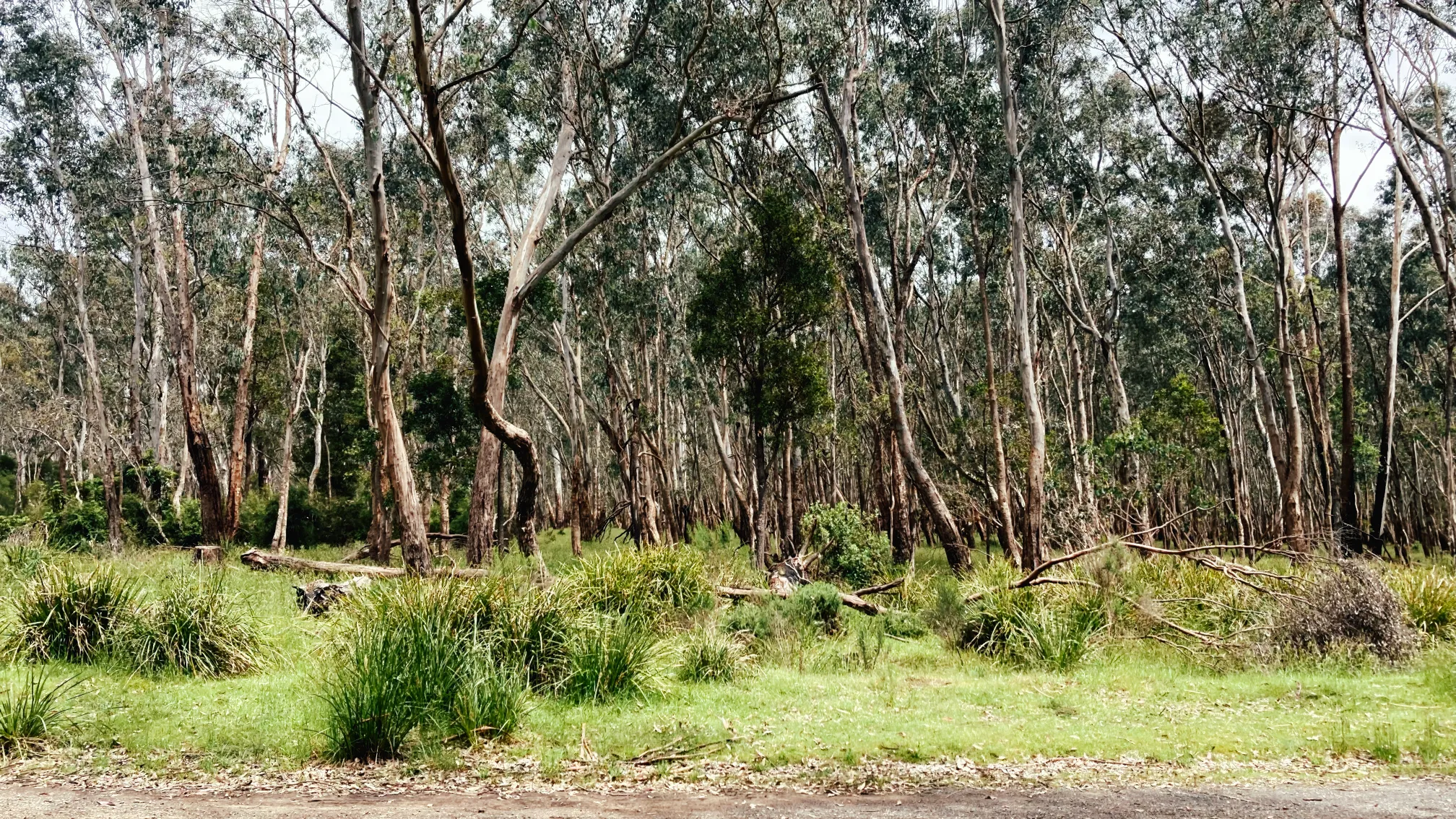
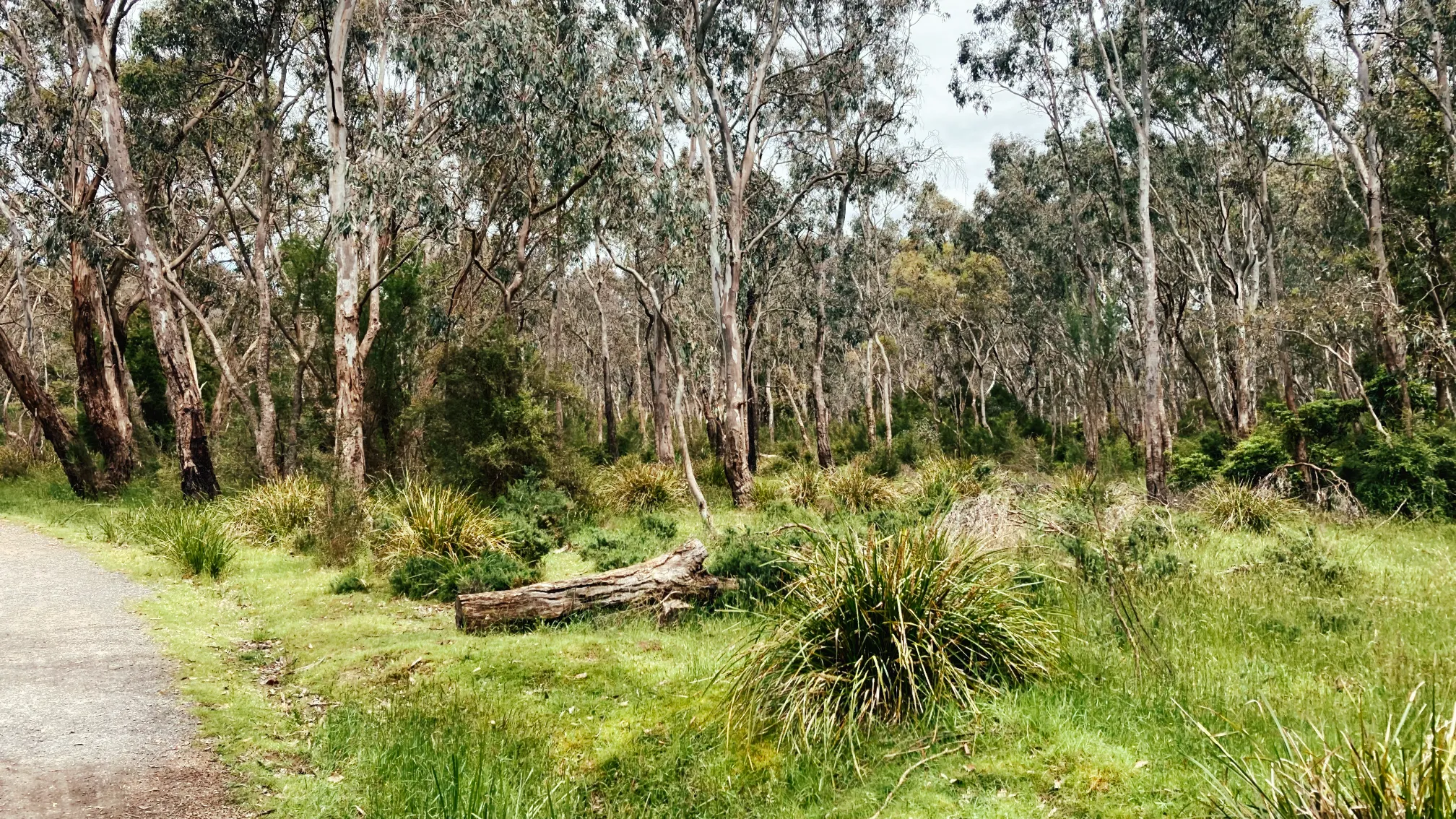
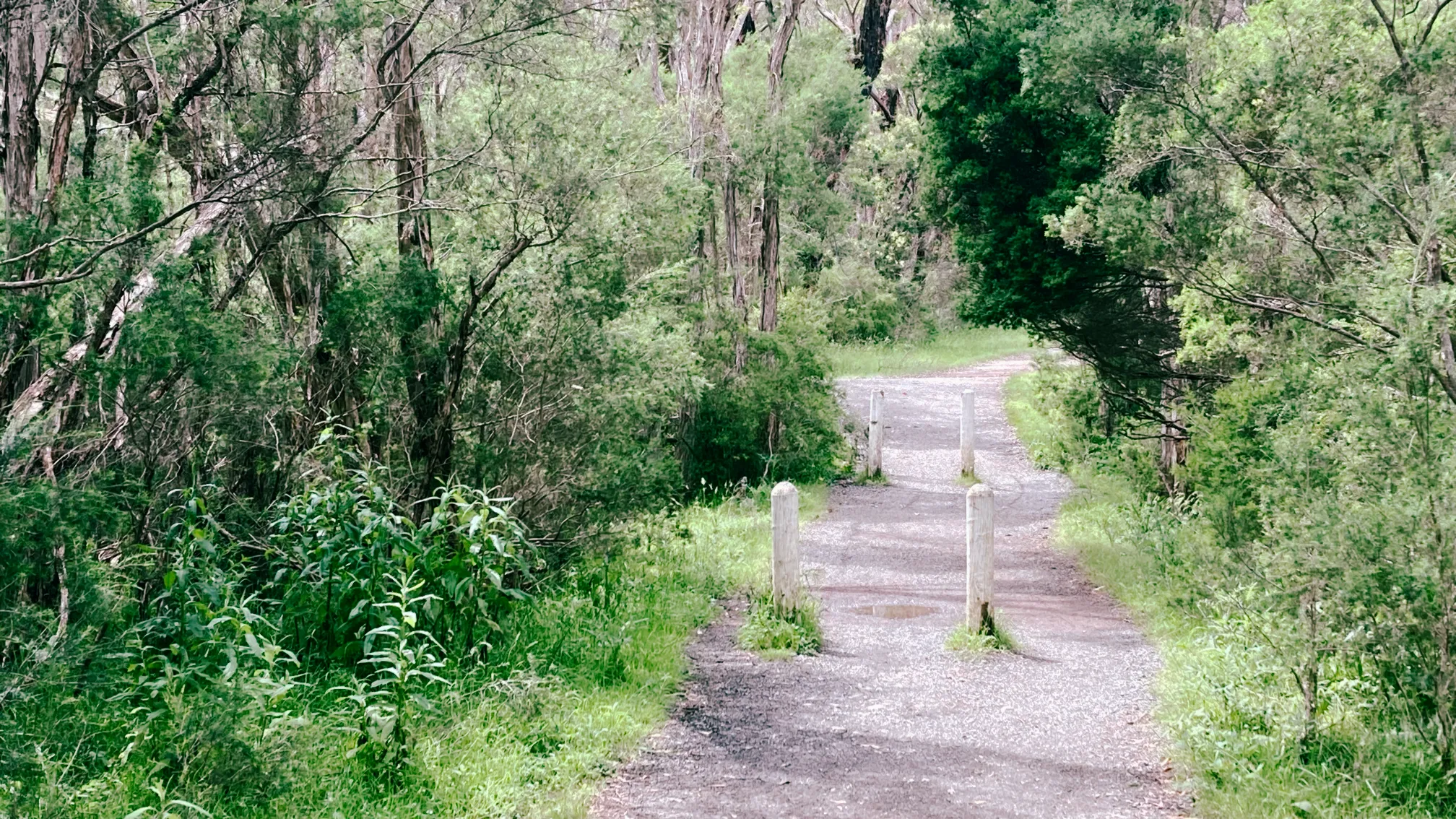

— LOW←TECH MAGAZINE runs a solar-powered website that sometimes goes offline when the battery powering their server runs dry during spells of bad weather. The background showing the current battery status is a nice touch.
— “Moving everything to RSS.” Excellent summary of where to find RSS feeds of popular sites and privacy-friendly ways to read them.
Some Boots
— I have kept coming back to Some Boots once every year for the last fifteen years. And I listen to it on heavy rotation for a couple of days. The whole album aged so well. Karate must be one of the most underrated bands out there.
Buy from Bandcamp (US$7).
— “The Map” is a short documentary by Gary Hustwit about the redesign of New York’s subway map and the accompanying online app.
— Bear Blog is another unobtrusive new blogging platform. It supports the basics: No trackers or JavaScript, custom domains, themes, and feeds. There’s also a version for self-hosting.
— Hand-drawn map of Melbourne’s inner city, for visitors. Includes directions where to buy lemongrass for dinner.
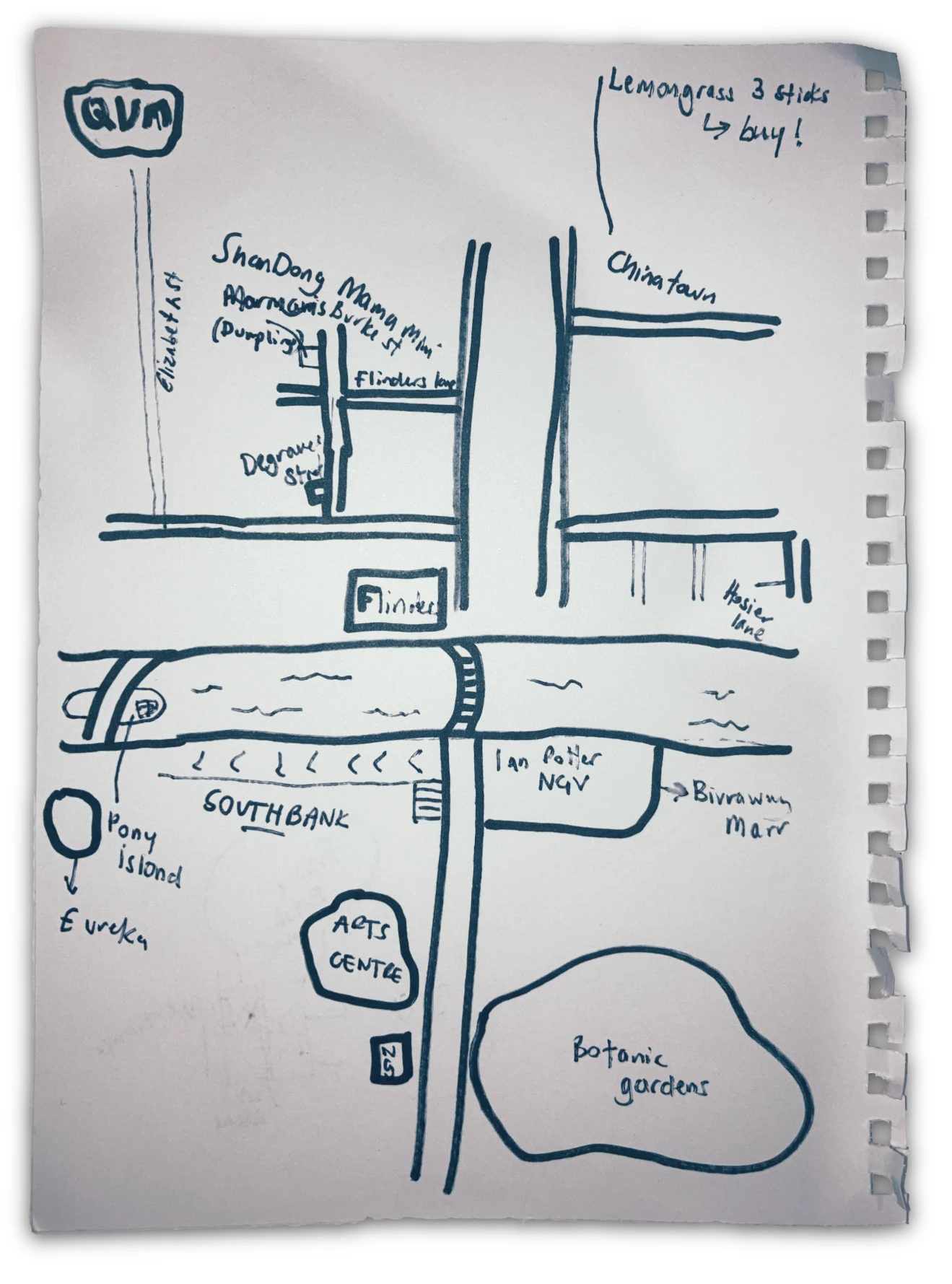
— Simon Willison uses an interesting analogy to explain how Mastodon works. It’s like blogs. You can host your own or use a shared instance, and it also acts as a feed reader.
I sure hope that the rekindled interest in blogging won’t be stifled by everyone just moving from Twitter to Mastodon. Despite what everybody says, how different Mastodon feels, the parts I always hated about Twitter, the condensed hot takes optimised for likability and shareability and devoid of nuanced thinking — we would see that too on Mastodon once it takes off.
— What to blog:
A blog post is not the same as an essay or article. It’s simply an update to the log of information you’re writing on your website. That stream of posts, together, makes up your blog. So a post can be as short or as long as you like. It’s your voice, so they can also be as formal or informal as you like.
Causeway
— I loved the slow pace of Causeway and its subdued vibe, but the story is too thin. Two traumatised people meet, then hang out drinking beer and getting high. That’s it; that’s the whole plot.
— Manchester City, the football club, is developing a scarf that tracks fans’ physiological reactions during games. Imagine this: After a heart-breaking loss in injury time, your smart watch sends you a notification offering anti-depressants at a local pharmacy, discounted for ticket holders.
— Assorted quotes by Paul Ford, writing about boring technology:
Disruption is an ethos for the bored, for people who live in reasonable climates and don’t have tanks in the street.
And:
You can’t just say “software is eating the world” and chill. Software already ate the world, and digested it, and pooped out a new world, and that’s where we’re living.
And:
Stability is my new best friend. Not the big stuff, the UN-level stuff. Leave that to the smart macro-thinkers with European accents and interesting all-weather clothing, or the sad Americans with Substacks.
Paul Ford is always a joy to read.
— Some appropriate descriptions of West-London stations on the new Elizabeth Line:
- “sparse futuristic box”
- “bland commuter funnel”
- “gorgeous listed throwback”
- “original brick building leading to unshowy box”
Anything in a Database Can Be Deleted
— A birdwatch note has disappeared from one of Elon Musks tweets, where he was moaning about losing advertising money. I don’t know if Musk ordered to have the note removed or if this resulted from a community review — and I don’t want to speculate.
According to official statements, Birdwatch notes cannot be edited or deleted by Twitter staff. Obviously, this is only partially true.
This blog is built with Jekyll, and a Git repository is its database. I can delete a post quickly, but it will still be available in the commit history. With a little more effort, using git rebase, I can purge the post entirely from history as if it never existed.
There might not be a user interface for Birdwatch notes that Twitter staff can use to remove and delete notes quickly. But the note lives in a database alongside tweets, user information, and likes. In that database, you can amend entities and their relationships. If you have direct access to the database and if you know how to google the SQL command you need, you don’t need a graphical user interface to make changes.
Usually, only a few people in an organisation have this kind of access. But if you own the place, you can find that person, and from there, it’s as simple as DELETE FROM birdwatch_notes WHERE tweet_id = '1588538640401018880';
Anything in a database can be deleted. And here lies a potential problem with Musk’s ownership of Twitter. Nothing can stop him from ordering content removal if pressed by the authoritarian regime of a country where he wants to sell Teslas.
— Douglas Bowman remembers Wired’s redesign 20 years ago, the first major project to ship a standards-conformant website. This was a big deal then; it’s how I first learned that you don’t need tables to lay out a website.
— Antarctica has bars. Several of them.
— In the UK, true north, grid north, and magnetic north will be aligned in the coming years at different places around the country. If you’re around Poole in the coming weeks, you can trust your compass for once.
— What do you do when you’re bored, and you have too much money on your hands? You invest in a sport you don’t understand, in a country you don’t understand.
While the variety of devices launched or updated are as disparate as a home-roaming robot and a television set, Amazon’s hardware chief, Dave Limp, is emphatic that they all serve the company’s grand mission—constructing a silent infrastructure of ambient intelligence to do just about anything for us.
Think of it as the opposite of the metaverse: Instead of asking people to venture into an artificial virtual world, Amazon wants to weave its computing products, whether it builds them itself or licenses the technology to others, into our homes and cars, to the point where the technology seems invisible, even as it switches on gadgets, alerts us to home intruders, and figures out what we want to watch or read next.
As predicted in 2006 by Adam Greenfield in his visionary book Everyware.
— Hoodmaps classifies neighbourhoods in cities worldwide according to their vibe. In London, the map shows people in Sydenham are rich, and hip in Selhurst. Whoever provided the data has clearly never been to South London.
Cheat Codes
— Hands down, Cheat Codes is the best rap album in the last five years. Danger Mouse’s production is on point, as always. Black Thought is one of the best MCs out there; I’m glad his gig in Kimmel’s show band leaves enough time to create something worthwhile. The album is delightfully old-fashioned without sounding too much like it was made during the boom bap era. It’s modern hip hop, but it sounds old. I’m old, hence I’m loving Cheat Codes.
— Nicheless is a micro-blogging service that limits posts to 300 words, and doesn’t publicly display replies, likes, and follower count.
— The Browser Company have hired Darin Fisher to build Arc, a new browser:
Arc is full of new ideas about how web browsers can work: it combines bookmarks and tabs into one app switcher-like concept; it makes it easy to search among your open tabs; it has built-in tools for taking notes and making shareable mini websites.
Arc is very different from other browsers. The breadth of new functionality in Arc is overwhelming at first. I initially toyed around with Arc for an hour and then didn’t open it for a couple of weeks. But I came back, and it’s growing on me.
Most of our work happens in browsers today, meetings, emails, calendars, or writing. And Arc does an excellent job of grouping all those aspects into spaces, split panels, keeping important tabs open, closing others automatically. Overall it’s a more organised browsing experience.